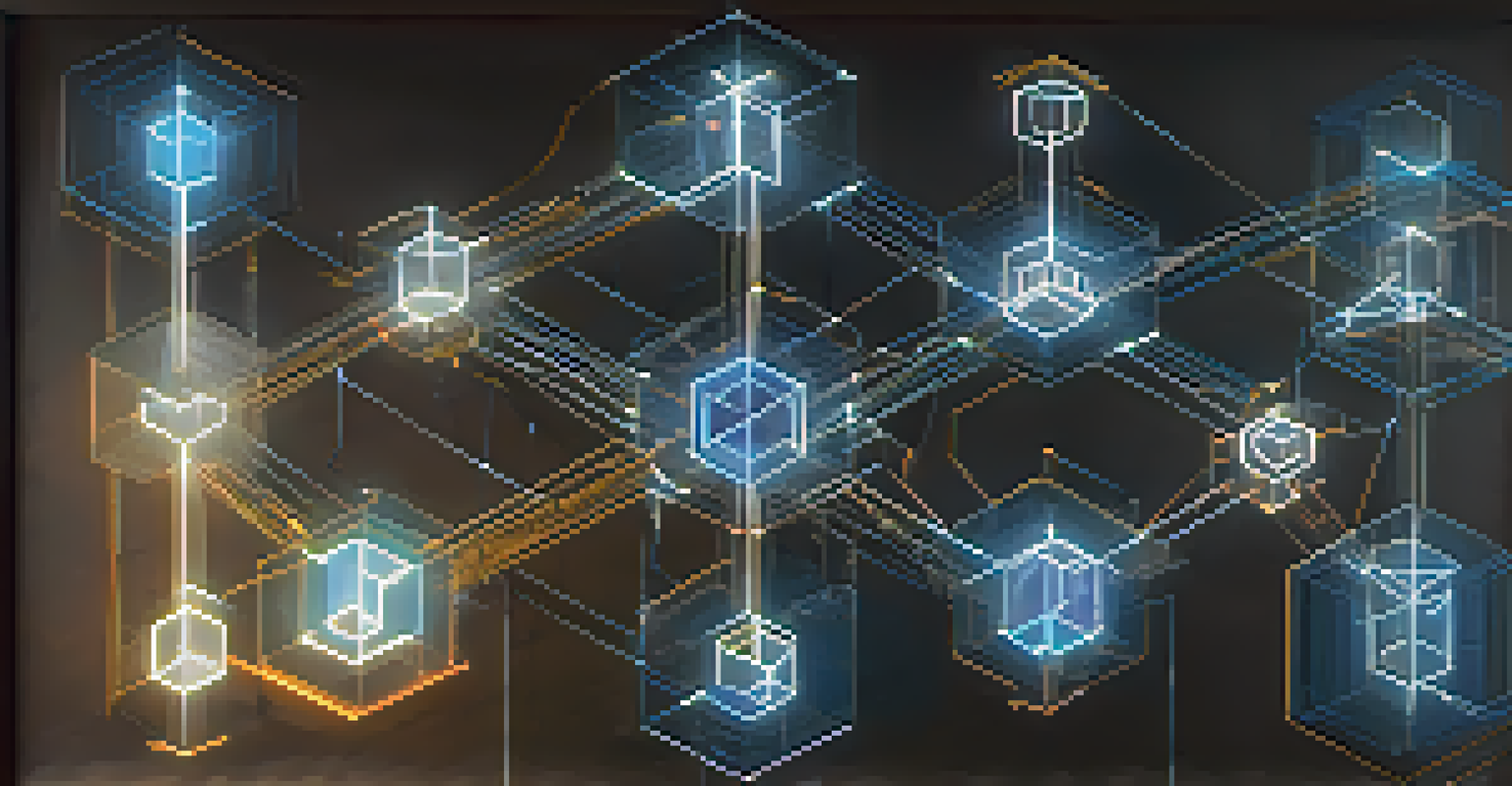Decentralized Autonomous Organizations and the Future of Work

Understanding Decentralized Autonomous Organizations (DAOs)
Decentralized Autonomous Organizations, or DAOs, are innovative entities that operate on blockchain technology, promoting transparency and decentralization. Unlike traditional organizations, DAOs rely on smart contracts to automate decision-making processes, allowing members to participate directly in governance. This means that anyone can have a voice in how the organization is run, without the need for a centralized authority overseeing everything.
The future of work is not about where you are, but how you collaborate.
Imagine a cooperative where every member has an equal say, similar to a community garden where everyone contributes to decisions about what to plant and how to manage the space. This collaborative spirit is at the heart of DAOs, enabling diverse perspectives to shape the organization's future. As a result, DAOs can adapt quickly to changes and challenges, making them agile players in today's fast-paced world.
DAOs are particularly appealing to tech-savvy individuals who value transparency and inclusivity. By leveraging blockchain, these organizations can ensure that all actions and decisions are recorded immutably, which builds trust among members and stakeholders alike. This shift towards transparency could redefine how we view ownership and accountability in the workplace.
The Role of Smart Contracts in DAOs
Smart contracts are self-executing contracts with the terms of the agreement directly written into code. In the context of DAOs, they play a crucial role by automating governance and operational tasks, allowing organizations to function without constant human intervention. Think of smart contracts as the rules of a board game; they dictate how players interact and what happens in various scenarios.

For example, when a member proposes a new project, a smart contract can automatically execute a voting process among members. If a certain percentage agrees, the project is funded without any need for a centralized decision-maker. This not only speeds up the process but also eliminates biases that might occur in traditional organizational structures.
Empowerment Through Collaboration
DAOs allow every member to participate in decision-making, fostering a sense of ownership and engagement.
Moreover, the use of smart contracts in DAOs can enhance security and reduce costs. By minimizing the need for intermediaries, organizations can allocate more resources towards their core mission. This shift enables a more efficient allocation of funds and fosters a culture of trust within the organization.
How DAOs Are Changing Work Dynamics
DAOs are revolutionizing work dynamics by promoting a more egalitarian approach to decision-making. In traditional organizations, hierarchies often dictate who gets to voice their opinions and make critical decisions. In contrast, DAOs empower all members to participate actively, creating an environment where everyone's input is valued and considered.
In a world where you can be anything, be collaborative.
This shift can lead to increased job satisfaction and engagement, as members feel more invested in the organization's success. Imagine working in a place where your ideas are not just heard but actively shape the future direction of the company. This sense of ownership can motivate individuals to contribute more creatively and energetically.
Additionally, the global nature of DAOs allows for diverse teams to collaborate across borders. This means that talent is no longer restricted by geography; organizations can tap into a broader pool of skills and perspectives. As a result, DAOs can foster innovation and creativity, ultimately enhancing their competitive edge in the market.
The Benefits of Flexibility in DAOs
One of the standout features of DAOs is their inherent flexibility. Unlike traditional organizations that may struggle to adapt to change, DAOs can pivot quickly based on member feedback and market conditions. This adaptability can be likened to a river that flows around obstacles rather than a rigid structure that must be rebuilt.
This flexibility allows DAOs to experiment with new ideas and approaches without the fear of extensive bureaucratic hurdles. For example, if a new project isn’t yielding the desired results, members can easily redirect resources or shift focus without lengthy discussions or approvals. This dynamic environment encourages innovation and responsiveness to the ever-evolving business landscape.
Smart Contracts Automate Governance
Smart contracts streamline processes in DAOs, enabling efficient decision-making without centralized authority.
Furthermore, the ability to work asynchronously across different time zones enhances productivity. DAOs can operate 24/7, with members contributing when it suits them best. This means that work-life balance can be more easily achieved, as individuals can fit their contributions into their personal schedules.
Challenges Faced by Decentralized Autonomous Organizations
While DAOs present exciting opportunities, they also come with their own set of challenges. One significant hurdle is the potential for governance disputes, as differing opinions can lead to conflicts among members. Just like any group project, when everyone has a say, disagreements can arise, making consensus-building essential.
Additionally, navigating the legal landscape can be complex for DAOs, as regulations may not yet fully recognize decentralized entities. This uncertainty can create risks for organizations and their members, leading to hesitance in participating or investing. Clarity in this area is essential for DAOs to thrive and gain broader acceptance.
Lastly, the technology that underpins DAOs can be a barrier for some individuals. Not everyone is familiar with blockchain or the technical aspects of smart contracts, which can alienate potential members. Education and outreach efforts will be crucial in bridging this gap and ensuring that DAOs can attract and retain a diverse membership.
The Future of Work in a DAO-Driven World
As we look ahead, the integration of DAOs into various industries could reshape the future of work significantly. Imagine workplaces where hierarchical structures are replaced by collaborative networks, with teams formed around specific projects rather than fixed roles. This fluidity could lead to more creative problem-solving and efficient execution of tasks.
Moreover, as remote work continues to gain popularity, DAOs could provide the perfect framework for managing distributed teams. With built-in governance mechanisms and transparent operations, organizations can maintain cohesion and direction even when members are spread across the globe. This could be a game-changer for companies looking to harness global talent.
DAOs Foster Flexibility and Innovation
The adaptable nature of DAOs allows them to pivot quickly in response to member feedback and market changes.
Ultimately, the rise of DAOs could herald a new era of work characterized by greater autonomy, collaboration, and innovation. As more individuals and organizations embrace this model, we may witness a shift in how we define success and productivity in the workplace. The future could be one where work feels less like a chore and more like a collective journey toward shared goals.
Getting Involved with DAOs: A Step-by-Step Guide
If you're intrigued by the idea of DAOs and want to get involved, there's no better time to start! First, familiarize yourself with the basics of blockchain technology and smart contracts to understand how DAOs operate. Numerous online resources, courses, and communities can help you grasp these concepts in a digestible way.
Next, explore various DAOs that align with your interests and values. Many platforms offer opportunities for participation, whether through governance voting, contributing to projects, or simply joining discussions. Think of it as finding a club that resonates with your passions—there's bound to be a DAO out there that matches your enthusiasm.

Finally, don’t hesitate to engage actively within your chosen DAO. Participate in discussions, share your ideas, and contribute your skills. The more you involve yourself, the more rewarding your experience will be. As you navigate this new world of decentralized collaboration, you might just discover a sense of community and purpose that transforms your work life.